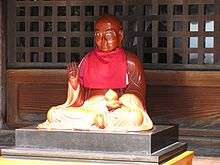Sixteen Arhats

The Sixteen Arhats (Japanese: 十六羅漢, Juroku Rakan; Tibetan: གནས་བརྟན་བཅུ་དྲུག, "Neten Chudrug") are a group of legendary Arhats in Buddhism. The grouping of sixteen Arhats was brought to China, and later to Tibet, from India. In China, an expanded group of Eighteen Arhats became more popular, but worship of the sixteen Arhats continues to the present day in Japan and Tibet. In Japan sixteen Arhats are particularly popular in Zen Buddhism, where they are treated as examples of behaviour.[1] In Tibet, the sixteen Arhats, also known as sixteen sthaviras ('elders') are the subject of a liturgical practice associated with the festival of the Buddha's birth,[2] composed by the Kashmiri teacher Shakyahribhadra (1127-1225).[3] They are also well represented in Tibetan art.[4]
The sixteen Arhats are:
| Sanskrit | Chinese | Japanese pronunciation | Tibetan | Tibetan pronunciation |
|---|---|---|---|---|
| Pindola Bharadvāja | 賓度羅跋囉惰闍尊者 | Bindora Baradāja sonja | བྷ་ར་དྭ་ཛ་སོ་ཉོམ་ལེན | Baradadza Sonyomlen |
| Kanakavatsa | 迦諾迦伐蹉尊者 | Kanakabassa sonja | གསེར་གྱི་བེའུ | Sergyi Be'u |
| Kanaka Bharadrāja | 迦諾迦跋釐堕闍尊者 | Kanakabarudaja sonja | བྷ་ར་དྭ་ཛ་་གསེར་ཅན | Baradadza Serchen |
| Subinda/Abhedya | 蘇頻陀尊者 | Subinda sonja | མི་ཕྱེད་པ | Michepa |
| Nakula/Vakula | 諾距羅尊者 | Nakola sonja | བ་ཀུ་ལ | Bakula |
| Bhadra | 跋陀羅尊者 | Badara sonja | བཟང་པོ | Zangpo |
| Kālika | 迦哩迦尊者 | Kalika sonja | དུས་ལྡན | Duden |
| Vajriputra | 伐闍羅弗多羅尊者 | Bajarabutara sonja | རྡོ་རྗེ་མོའི་བུ | Dorje Mobu |
| Jīvaka/Gopaka | 戎博迦尊者 | Jubaka sonja | སྦྱེ་བྱེད་པ | Bejepa |
| Panthaka | 半託迦尊者 | Hantaka sonja | ལམ་བསྟན | Lamten |
| Rāhula | 囉怙羅尊者 | Ragon sonja | སྒྲ་གཅན་འཛིན | Drachendzin |
| Nāgasena | 那伽犀那尊者 | Nagasena sonja | ཀླུ་སྡེ | Lude |
| Ańgaja | 因掲陀尊者 | Ingada sonja | ཡན་ལག་འབྱུང | Yanlag Jung |
| Vanavāsin | 伐那婆斯尊者 | Banabasu sonja | ནགས་ན་གནས | Nagnane |
| Ajita | 阿氏多尊者 | Ajita sonja | མ་ཕམ་པ | Mapampa |
| Cūdapanthaka | 注荼半吒迦尊者 | Chudahantaka sonja | ལམ་ཕྲན་བསྟན | Lamtrenten |
- The Sixteen Arhats in Art
 Covered Box in the Shape of Sixteen Arhats in a Begging Bowl
Covered Box in the Shape of Sixteen Arhats in a Begging Bowl

- The Sixteen Arhats from the Alice S. Kandell Collection
 Arhats Rahula, Cudapanthaka, and Pindola
Arhats Rahula, Cudapanthaka, and Pindola Arhats Kanakavasta, Vajriputra, Kanaka-Bharadvaja, and Bhadra
Arhats Kanakavasta, Vajriputra, Kanaka-Bharadvaja, and Bhadra Arhats Ajita, Kalika, and Vanavasin
Arhats Ajita, Kalika, and Vanavasin Arhats Panthaka, Nagasena, Gopaka, and Abheda
Arhats Panthaka, Nagasena, Gopaka, and Abheda
See also
| Wikimedia Commons has media related to 16 Arhats. |
